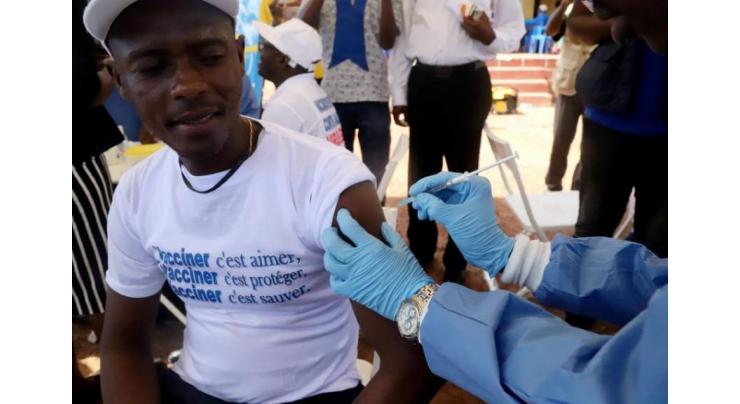
Confusion Around Ebola Vaccine Hampering DRC Outbreak Response: MSF
Mohammad Ali (@ChaudhryMAli88) Published May 24, 2018 | 10:55 PM

Confusion around an unlicensed Ebola vaccine being used in the Democratic Republic of Congo is complicating efforts to rein in an outbreak of the deadly virus, Doctors Without Borders warned Thursday
Geneva, (UrduPoint / Pakistan Point News - 24th May, 2018 ) :Confusion around an unlicensed Ebola vaccine being used in the Democratic Republic of Congo is complicating efforts to rein in an outbreak of the deadly virus, Doctors Without Borders warned Thursday.
DRC health officials launched a small, targeted vaccination campaign this week to help rein in the latest Ebola outbreak in the country, which so far has claimed 27 lives. The campaign, using an unlicenced vaccine, is beginning with first responders, and will soon move to anyone who has been in contact with suspected cases, and then on to the contacts of the contacts.
WHO said Wednesday that some 10,000 people should be vaccinated within the next month. But Doctors Without Borders, known by its French acronym MSF, cautioned that, among many people on the ground, there was confusion and uncertainty about the vaccine and who could receive the jab.
"The messaging around the vaccine has not been well done," Jean-Clement Cabrol, MSF's emergency medical coordinator, told reporters in Geneva following his latest trip to the affected region. He cautioned against the widespread description of the rVSV-ZEBOV vaccine as "experimental".
"I think that using words like 'experimental vaccination' does not simplify things," he said. The vaccine has been deemed highly effective and safe by WHO, but has not yet received a licence. Cabrol also said that all of the talk about the vaccine had given the false impression on the ground that there would be a mass vaccination campaign, and may have led some to believe the vaccine could magically fix the problem.
"We are seeing people today who refuse to be hospitalised, even though they have tested positive, saying that they prefer to wait for the vaccine," he said. This is obviously not good when dealing with Ebola, a virus-caused haemorrhagic fever, which spreads through contact with bodily fluids and which is both highly infectious and extremely lethal.
According to WHO's latest toll, 58 Ebola cases have so far been identified since early April. The current outbreak, which was officially declared on May 8, began in rural northwestern DRC in a very remote area called Bikoro.
But it has since spread to Mbandaka, a city of around 1.2 million people, and there are fears it could spread further afield in DRC and to neighbouring countries. - 'Witchcraft' - "What is worrying is that almost every day we have new confirmed cases at a quite rapid pace," Cabrol said.
He said DRC, WHO and others had responded quickly and robustly to the outbreak, but warned that efforts to inform the population in the affected areas of how best to protect themselves and others was still "insufficient".
"A large portion of the population does not understand this illness (and) thinks it is witchcraft" or something similar, he said, adding that there had been threats against doctors and others coming in to care for the sick, and who were accused of bringing the virus with them.
Cabrol stressed that rVSV-ZEBOV was meant "only as an additional tool" in responding to the outbreak. The main focus, he said, still needed to be on informing people how to protect themselves and others against Ebola, and on tracking and isolating Ebola cases, and finding all of their contacts and contacts of contacts.
For each confirmed case, 80 people should receive the vaccine, he said. But there are large logistical challenges with delivering the vaccine, including the fact that it needs to be stored at -80 degrees Celsius (-112 degrees Fahrenheit), Cabrol said. For now, only about 40 vaccinations per day are feasible, he said.
Recent Stories

Tennis: ATP Barcelona Open results - 1st update

Swiatek's perfect 10 in Stuttgart as Vondrousova stuns Sabalenka

Arandu's roads closed due to flooding

Oil tanker catches fire in Islamabad’s Blue Area

Pakistan committed to ensure safety of foreign nationals: FO

Tennis: WTA Stuttgart results - 1st update

Four passengers injured as train hit an empty vehicle

Over- speeding bus crushed to death two bike riders

Turkey's Freedom Flotilla ready to set sail for Gaza

French teen dies from heart failure after knife attack near school

Iranians appear unfazed by Isfahan blasts

UAF celebrates Int'l Chinese Language Day
More Stories From Health
-

Rawalpindi woman gives birth to six babies
9 hours ago -

DC calls for intensive anti-polio drive in ICT
1 day ago -

World Hemophilia Day observed to underscore importance of providing comprehensive care
2 days ago -

Six in a family with heart on the 'right side'
2 days ago -

Diabetic disease increasing rapidly : Dr. Noor Elahi Memon
2 days ago -

World Hemophilia Day observed
2 days ago
-

ATC dismisses bail petition of doctor involved in illegal kidneys transplant
10 days ago -

Dr. Shehzad warns against deviation from WHO guidelines on anti-smoking
10 days ago -

Health activists express concerns over attempts to derail tobacco control
12 days ago -

UHS declares MBBS first prof, MS urology exam results
21 days ago -

Increased diagnostic testing for drug resistance
27 days ago -

IRD releases groundbreaking results of end TB programme
29 days ago











